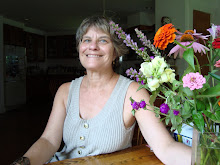Yes, here I am in an Internet cafe in Ramallah, not far from where Arafat used to be holed up, surrounded by Israeli soldiers. So many sights, conversations, impressions, reactions in the last few days as we came from Jerusalem through the checkpoint to Bethlehem, Hebron, and now Ramallah that I'm not even sure where to begin. Perhaps I'll start on the light side by saying that one of the co-leaders of our west bank tour, Dunya (I can't remember her last name), is a Hampshire College grad, and last night one of my former students (a 2005 graduate), Ryvka Bar-Zohar, who is living in Ramallah for the summer while she studies Arabic at Beir Zeit U., joined us for supper in a lovely park restaurant in Ramallah, so there are the 3 of us, eating our humus and felafel, and discussing Div III's. And Ryvka is even smoking a hookah! Do you think Div III's have ever been discussed before in the West Bank?
Perhaps the strongest impression on me so far has been made by our tour of Hebron, led by a very articulate Palestinian former news cameraman and journalist named Hishon Charabati (maybe not exactly right; I don't have my notes with me); we saw how Hebron, a gorgeous old stone city, has been chopped up in ridiculous little parts, with barbed wire and locked barricades, by Israeli settlers, who move into certain places and then bring along with them a huge "security" apparatus: special roads, protective barriers, checkpoints, military patrols. Palestinians can't go into these places, so they have to live in their city like in a checkboard, taking weird detour routes around these Israeli enclaves. But nothing is simple -- the reason the very first Israeli settlers were able to move into Hebron, back in the late 1970's, is that in 1929, there was an Arab massacre of pre-Israeli Zionist settlers in the city, and their former houses, which were kept empty all those years (I don't know why), were the ones the new Israeli settlers moved into. This is far from an original observations, but the whole thing is unbelievably complex: each layer with twenty more layers underneath it, like peeling back the sheets of filo dough in a pastry, equally sticky, though certainly not equally sweet!
The other strong impression I have had is of some of the amazing people -- particularly, though by no means exclusively, women -- who are working on this conflict: smart, dedicated, amazingly competent and thoughtful under impossible circumstances. I'll only mention two: Allegra Pacheco, an originally American, Israeli, now Palestinian human rights lawyer who gave us an incredible talk despite being 8 and 7/8 months pregnant (she looked like she'd have to leave the room to give birth), and Zizette Something (I can't remember her last name), a legal advisor to the Palestinian Fatah negotiating team, also 5 months pregnant and brilliant. They made me feel like quite a shlump, but also incredibly proud and happy that there are such people in the world. Google their names for more; my internet time in over. Love to all, Stephanie
Subscribe to:
Post Comments (Atom)



No comments:
Post a Comment